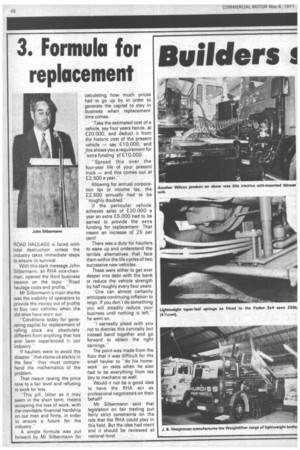3. Formula for replacement
Page 78

If you've noticed an error in this article please click here to report it so we can fix it.
'ROAD HAULAGE is faced with total destruction unless the industry takes immediate steps to ensure its survival.
With this stark message John Silbermann, an RHA vice-chairman, opened the third business session on the topic "Road haulage costs and profits.
Mr Silbermann's main theme was the inability of operators to provide the money out of profits to buy new vehicles when the old ones have worn out.
"Conditions today for generating capital for replacement of rolling stock are absolutely different from anything that has ever been experienced, in our industry."
If hauliers were to avoid the disaster "that stares us starkly in the face" they must comprehend the mathematics of the problem.
That meant raising the price now to a fair level and refusing to work for less.
"This pill, bitter as it may seem in the short term, means accepting the loss of work, with the inevitable financial hardship on our men and firms, in order to ensure a future for the industry."
A simple formula was put forward by Mr Silbermann for calculating how much prices had to go up by in order to generate the capital to stay in business when replacement time comes.
"Take the estimated cost of a vehicle, say four years hence, at £20,000, and deduct it from the historic cost of the present vehicle — say £10,000, and this shows you a requirement for 'extra funding' of £10,000.
"Spread this over the four-year life of your present truck — and this comes out at £2,500 a year.
Allowing for annual corporation tax or income tax, the £2,500 annually had to be "roughly doubled."
If the particular vehicle achieves sales of £20,000 a year an extra £5,000 had to be earned to provide the extra funding for .replacement. That meant an increase of 25 per cent!
There was a duty for hauliers to wake up and understand the terrible alternatives that face them within the life cycles of two successive new vehicles.
These were either to get ever deeper into debt with the bank or reduce the vehicle strength by half roughly every four years.
''One can almost certainly anticipate continuing inflation to reign. If you don't do something you will steadily reduce your business until nothing is left,he went on.
"I earnestly plead with you not to dismiss this cynically but instead band together and go forward to obtain the right earnings."
The point was made from the floor that it was difficult for the small haulier to "do his homework" on rates when he also had to be everything from tea boy to mechanic as well.
Would it not be a good idea to have the RHA act as professional negotiators on their behalf?
Mr Silbermann said that legislation on fair trading put fairly strict constraints on the role that the RHA could play in this field. But the idea had merit and it should be reviewed at national level.
























































































































